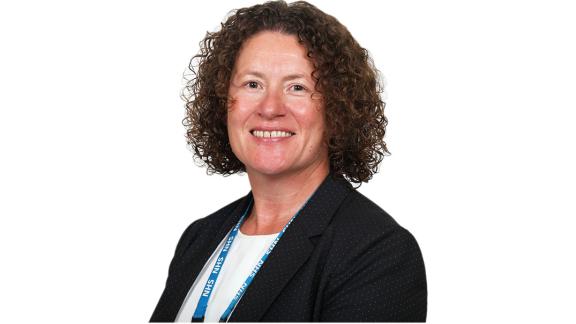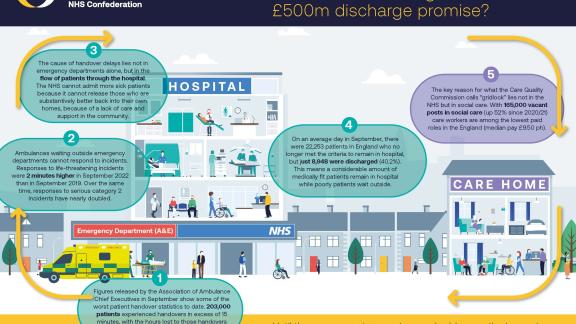New focus, old problem: tackling delayed discharges this winter and beyond

Siobhan Melia outlines the national actions that will be needed alongside the new discharge funding to support health and care organisations locally, and highlights examples of community providers that are supporting people home from acute and community beds.
The government recently announced £500 million of funding to ‘get people out of hospitals and into social care support’ this winter. the funding was part of the plan for patients unveiled by the new Secretary of State For Health and Social Care, Thérèse Coffey, coming under ‘C’ for ‘care’ in her much-reported ABCD priorities.
Community providers were pleased to see this issue get national attention. Levels of delayed discharges remain high, with one in seven hospital beds occupied by someone who is medically fit to go home. And alongside the focus on discharge from acute hospitals, we must not forget the importance of planned and funded support for those leaving community beds, community teams and inpatient mental healthcare.
Services will take time to become operational so providers need to know now about the additional capacity they will be able to call upon
It will be important for the government to release this funding as soon as possible if it is to have the impact we need it to this winter. Services will take time to become operational so providers need to know now about the additional capacity they will be able to call upon.
Why are delayed discharges an issue?
Despite progress made during the pandemic, delayed discharges re-emerged as a significant issue last winter, driven by pent-up demand for services, a social care system in crisis and overstretched NHS capacity.
Even though there have been national targets to reduce discharge delays, and a helpful national discharge taskforce set up by NHS England to identify the action needed to drive progress, analysis published by the Nuffield Trust recently showed that delayed discharges increased by 57 per cent in the 12 months between April 2021 and April 2022.
Finding a solution is important for individuals, as delayed discharges are detrimental to people’s outcomes, often contributing to loss of independence, a drop in wellbeing or deconditioning physically. but it’s also important for maintaining patient flow through the system, reducing ambulance handover delays at a hospital ‘front door’ and ensuring people can go home with the right support at the right time.
What do we know about this funding?
Comparisons have been made with the discharge to assess (D2A) fund, which provided central, dedicated funding from March 2020 to March 2022 to guarantee four weeks of care support for each discharged person. This gave health and care organisations the financial headroom to free up hospital beds during the initial COVID-19 wave and drove down average length of stay. However, the recent funding announcement is different in two key ways.
Firstly, the £500 million will be drawn from the Department of Health and Social Care’s existing budget, including money freed up by government’s reversal of the national insurance rise at a time when the NHS is now facing the prospect of a real-terms funding cut due to inflation. We therefore need to understand what other services or priorities might be impacted.
Community providers will want to see local flexibility and autonomy guiding decisions about how best to use this funding, as well as ensuring there is clear accountability for spending and delivering against it
Secondly, we need to understand how the funding will be allocated, whether it will be to local authorities, integrated care boards, or through the Better Care Fund. Community providers will want to see local flexibility and autonomy guiding decisions about how best to use this funding, as well as ensuring there is clear accountability for spending and delivering against it.
Learning from community providers
Community providers play a pivotal role in supporting people home from acute and community beds, as well as keeping people well at home. While this funding will help shore up social care capacity this winter, community providers are keen to learn from existing good practice and build towards a more sustainable longer term vision for integrated care in the community.
We will need to learn from these examples, and more, as well as delivering future solutions at scale, if we are to make delayed discharges a thing of the past
For example, Central and North West London NHS Foundation Trust has worked with four care homes to set up its integrated Seacole Virtual Hospital, where the trust’s intermediate care unit and the care homes each now act like individual wards with medical cover.
City Health Care Partnership CIC has worked with Hull University Teaching Hospitals NHS Trust on a home-first discharge scheme, which supports the acute trust’s elective recovery plans. Patients are supported to return home at the earliest opportunity and receive enhanced intermediate care at home.
We will need to learn from these examples, and more, as well as delivering future solutions at scale, if we are to make delayed discharges a thing of the past.
What national action is needed?
Despite the important efforts of community and social care providers, as well as integrated care boards in bringing together partners to tackle this system-wide issue, national action is required to support the whole health and care system with discharges through this winter and beyond.
While short-term funding is welcome, we urgently need a sustainable long-term funding settlement for social care and wider reform to ensure the system is fit for purpose. We saw with D2A funding how the short-term, non-recurrent nature of the central funding created a cliff edge, which exacerbated recruitment issues particularly in the social care sector.
Community providers are hopeful that reinstating this funding will make a difference this winter, but this will still depend on recruiting and retaining enough staff to increase capacity. We urgently need a fully funded workforce plan – for NHS and social care staff – to really address the root causes of delayed discharges. This should encompass the work NHS England is doing on intermediate care provision.
Without these national actions, health and care organisations will struggle to deliver the best care possible for our local communities.
Siobhan Melia is chair of the Community Network, hosted by NHS Providers and the NHS Confederation. You can follow Siobhan on Twitter @siobhanmelia



